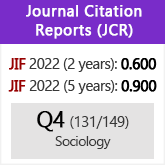Decentering the subject. Erving Goffman and the theorisation of the subject
DOI:
https://doi.org/10.3989/ris.2010.10.11Keywords:
Micro-sociology, Subjectivity, Symbolic InteractionismAbstract
This article synthesises the contributions of Erving Goffman and situational-interactionist sociology to rethinking the subject. In particular, it analyses the impact that this perspective has for the modern concept of subject and its contribution to a relational theory of the latter. The interactive nature of the subject, its constitutive multiplicity and the importance of superficial relations in its social configuration are three of the main ideas developed by this perspective and discussed in this paper. the article concludes by setting out the possibility of taking these claims as the starting point of a theory of the subject, and some of the difficulties this would entail.
Downloads
References
Badiou, Alain. 1999. El ser y el acontecimiento. Buenos Aires: Manantial.
Blackman, Lisa, John Cromby, Derek Hook, Dimitris Papadopoulos y Valerie Walkerdine. 2008. “Creating Subjectivities.” Subjectivity 22:1-27. http://dx.doi.org/10.1057/sub.2008.8
Blumer, Herbert. 1981. El Interaccionismo simbólico. Madrid: Hora.
Bourdieu, Pierre. 1972. Esquisse d’une théorie de la pratique. Genève: Droz.
Braidotti, Rosi. 2000. Sujetos nómades (Corporización y diferencia sexual en la teoría feminista contemporánea). Buenos Aires: Paidós. PMCid:2243722
Braidotti, Rosi. 2006. Metamorfosis: hacia una teoría materialista del devenir. Madrid: Akal.
Butler, Judith. 2001. El género en disputa. El feminismo y la subversión de la identidad. México: Paidós.
Butler, Judith. 2002. Cuerpos que importan: sobre los límites materiales y discursivos del «sexo». barcelona: Paidós.
Castel, Robert. 1989. “Institutions totales et configurations ponctuelles.” Pp. 31–43 en Le parler frais d’Erving Goffman, ed. Isaac Joseph. París: Les Éditions de Minuit.
Conein, Bernard. 1989. “Pourquoi doit-on dire bonjour (Goffman relu par Harvey Sacks).” Pp. 196-208 en Le parler frais d’Erving Goffman, ed. Isaac Joseph. París: Les Éditions de Minuit.
Corcuff, Phillipe. 1998. Las nuevas sociologías: construcciones de la realidad social. Madrid: Alianza editorial.
De Certeau, Michel. 2000. La invención de lo cotidiano. Vol 1: Artes de Hacer. México: Universidad Iberoamericana.
Delgado, Manuel. 2006. “Tránsitos. Espacio público, masas corpóreas”. Pp. 113-132 en La Interpretación del Mundo, cuestiones para el tercer milenio, eds. Adrés Ortíz-Oses Patxi Lanceros. Barcelona y México: Anthropos/Universidad Autónoma Metropolitana.
Delgado, Manuel. 2002. “Impostura y sociedad. Lo verdadero y lo verosímil en Erving Goffman.” Escala 5:11-17.
Denzin, Norman K., y Charles M. Keller. 1981. “Frame analysis reconsidered.” Contemporary Sociology: A Journal of Reviews 10:52–60.
Díaz, Felix. 2002. “Introducción: la ubicua relevancia de los contextos presenciales.” Pp. 9-38 en Sociologías de la situación, ed. Félix Díaz. Madrid: La Piqueta.
Giddens, Anthony. 1993. Las nuevas reglas del método sociológico. Crítica positiva de las sociologías interpretativas. buenos Aires: Amorrortu.
Goffman, Erving. 1961. Encounters: Two studies in the Sociology of Interaction. Indianapolis: bobbs-Merril.
Goffman, Erving. 1967. Interaction Ritual. Essays on Face to Face Behavior. Nueva York: Doubleday Anchor.
Goffman, Erving. 1970. Internados: Ensayos sobre la situación social de los enfermos mentales. Buenos Aires: Amorrortu.
Goffman, Erving. 1979. Relaciones en público. Microestudios de orden público. Madrid: Alianza.
Goffman, Erving. 1981. “A reply to Denzin and Keller.” Contemporary Sociology: A Journal of Reviews 10:60–68.
Goffman, Erving. 1974. Frame Analysis. An Essay on the Organization of Experience. Boston: Northeastern University Press.
Goffman, Erving. 1991. Los momentos y sus hombres. Barcelona: Paidós.
Goffman, Erving. 1997. La presentación de la persona en la vida cotidiana. buenos Aires: Amorrortu.
Goffman, Erving. 2006. Estigma: la identidad deteriorada. Buenos Aires: Amorrortu.
Hall, Stuart. 1996. “Introduction: who needs ‘identity’.” Pp. 1-17 en Questions of cultural identity, eds. Stuart Hall y Paul du Gay. Sage: London.
Herrera, Manuel y Rosa María Soriano. 2004. “La teoría de la acción social en Erving Goffman.” Papers 73:59-79.
Joseph, Isaac. 1989. “Erving Goffman et le problème des convictions.” Pp. 13-30 en Le parler frais d’Erving Goffman, ed. Isaac Joseph. París: Les Éditions de Minuit.
Joseph, Isaac. 1999. Erving Goffman y la microsociología. Barcelona: Gedisa.
Kristeva, Julia. 1995. Las nuevas enfermedades del alma. Madrid: Cátedra.
Mead, G.H. 1993. Espíritu, persona y sociedad: desde el punto de vista del conductivismo social. México/Buenos Aires/Madrid: Paidós.
Ogien, Albert. 1989. “La décomposition du sujet.” Pp. 100-109 en Le parler frais d’Erving Goffman, edited by Isaac Joseph. París: Les Éditions de Minuit.
Quéré, Louis. 1989. “‘La vie sociale est une scène’. Goffman revu et corrigé par Garfinkel.” Pp. 47–82 en Le parler frais d’Erving Goffman. Paris: Les Éditions de Minuit.
Ritzer, George. 1993. Teoría sociológica contemporánea. Madrid: McGraw-Hill Interamericana.
Simmel, Georg. 2001. El individuo y la libertad. Ensayos de crítica de la cultura. Barcelona: Península.
Winkin, Yves. 1990. “Erving Goffman: retrato del sociólogo joven.” Pp.11-91 en Los momentos y sus hombres. Barcelona: Paidós.
Wolf, Mauro. 2000. Sociologías de la vida cotidiana. Madrid: Cátedra.
Downloads
Published
How to Cite
Issue
Section
License
Copyright (c) 2012 Consejo Superior de Investigaciones Científicas (CSIC)

This work is licensed under a Creative Commons Attribution 4.0 International License.
© CSIC. Manuscripts published in both the printed and online versions of this Journal are the property of Consejo Superior de Investigaciones Científicas, and quoting this source is a requirement for any partial or full reproduction.All contents of this electronic edition, except where otherwise noted, are distributed under a “Creative Commons Attribution 4.0 International” (CC BY 4.0) License. You may read here the basic information and the legal text of the license. The indication of the CC BY 4.0 License must be expressly stated in this way when necessary.
Self-archiving in repositories, personal webpages or similar, of any version other than the published by the Editor, is not allowed.

















